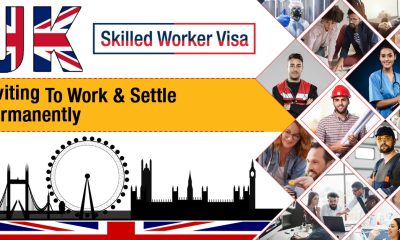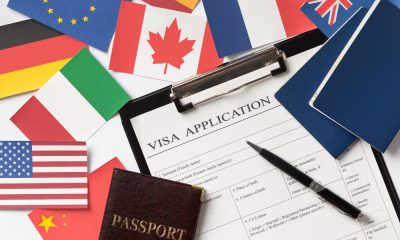Travel
A Full Guide About Choose a Right Migration Consultant

Planning to migrate to a new country can be an exciting yet overwhelming experience. From paperwork to legal procedures, the entire process can be complex and time-consuming. This is where a migration consultant comes into the picture. But how do you choose the right migration consultant who can guide you through the process and provide the necessary support? In this article, we will explore the key factors to consider when choosing the right migration consultant to ensure a smooth and successful transition.
The Importance of Choosing the Right Migration Consultant
When it comes to migrating to a new country, selecting the right migration consultant is vital. A professional and experienced migration consultant can provide expert guidance, streamline the paperwork, and ensure that you meet all the legal requirements. They have in-depth knowledge of immigration laws, regulations, and processes, which can save you time, money, and potential stress. Therefore, it is crucial to make an informed decision when choosing your migration consultant.
Factors to Consider When Choosing the Right Migration Consultant
Choosing the right migration consultant requires careful evaluation and consideration of several factors. By keeping the following aspects in mind, you can increase the chances of finding a consultant who aligns with your needs and provides the necessary support throughout your migration journey.

1. Experience and Expertise
When searching for a migration consultant, experience and expertise should be at the top of your checklist. Look for consultants with a proven track record and extensive experience in handling migration cases similar to yours. A knowledgeable consultant will have a deeper understanding of the immigration process and can effectively navigate any challenges that may arise.
2. Accreditation and Certification
Accreditation and certification are crucial indicators of a migration consultant’s credibility and professionalism. Ensure that the consultant you choose is registered with the appropriate regulatory body or is a member of a recognized migration association. This demonstrates their adherence to ethical standards and their commitment to providing quality service. here you may know about the migration consultant training also.
3. Client Testimonials and Reviews
One of the best ways to gauge the reputation and reliability of a migration consultant is by reading client testimonials and reviews. Look for feedback from previous clients who have successfully migrated under the guidance of the consultant. Positive reviews and testimonials indicate a high level of customer satisfaction and can instill confidence in their services.
4. Comprehensive Services
Migration involves various processes, such as visa applications, document preparation, and legal procedures. It is essential to choose a migration consultant who offers comprehensive services to cater to all your migration needs. This includes assistance with visa applications, document verification, skills assessment, and post-landing support.
5. Communication and Support
Effective communication is key to a successful client-consultant relationship. Choose a migration consultant who communicates clearly, and promptly, and provides regular updates on your application progress. ensure they offer reliable support channels, such as email, phone, or in-person consultations, to address any queries or concerns you may have.
6. Cost and Transparency
Migration can be a significant financial investment, and it is essential to consider the cost of hiring a migration consultant. While price should not be the sole determining factor, it is crucial to have clarity on the consultant’s fees and any additional charges. Look for transparency in pricing and ensure that you fully understand the services included in the package.
Frequently Asked Questions (FAQs) About Selecting the Right Migration Consultant
Here are some common questions people have when it comes to choosing the right migration consultant, along with their corresponding answers.
1. Why do I need a migration consultant?
Choosing the right migration consultant is crucial because they possess the knowledge and expertise required to navigate the complex immigration process. They can provide valuable guidance, handle paperwork efficiently, and ensure that you meet all legal requirements, increasing the chances of a successful migration.
2. How do I verify a migration consultant’s credentials?
To verify a migration consultant’s credentials, you can check if they are registered with the appropriate regulatory body or a member of a recognized migration association. You can ask for their certifications, licenses, or any other relevant documentation that confirms their qualifications and legitimacy.
3. Can I trust client testimonials and reviews?
Client testimonials and reviews can provide valuable insights into the reputation and reliability of a migration consultant. it’s important to consider multiple sources and evaluate the overall feedback. Look for consistency in positive reviews and consider reaching out to individuals who have left testimonials to gather more information about their experience.
4. What services should a migration consultant provide?
A reliable migration consultant should offer comprehensive services that cover various aspects of the migration process. This includes assisting with visa applications, document preparation, skills assessment, and providing post-landing support. Ensure that the consultant you choose aligns with your specific migration needs.
5. How can I ensure effective communication with my migration consultant?
When choosing a migration consultant, prioritize effective communication. Look for consultants who communicate clearly, promptly respond to queries, and provide regular updates on your application progress. It’s also important to establish preferred communication channels and ensure that the consultant is accessible when needed.
6. What factors should I consider when comparing costs?
While cost shouldn’t be the sole determining factor, it’s important to consider your budget when choosing a migration consultant. Compare the fees of different consultants and inquire about any additional charges or services not included in the package. Look for transparency in pricing and ensure that you understand the value you’ll be receiving for your investment.
Conclusion
Choosing the right migration consultant is a crucial step in ensuring a smooth and successful migration journey. By considering factors such as experience, accreditation, client testimonials, comprehensive services, communication, and cost, you can make an informed decision that aligns with your specific needs and requirements. Remember to verify the credentials of potential consultants, seek out client feedback, and establish open lines of communication to facilitate a seamless transition to your new home.

Travel
15 Best Highway Trips in Scotland for Full of Scenery & Story

Scotland is a land of spellbinding beauty, where every mile on the road reveals towering mountains, mystical lochs, medieval castles, and windswept coastlines. For travellers seeking adventure beyond the city limits, Scotland’s highways offer some of the most scenic and soul-stirring road trips in the world.
Whether you’re chasing the northern lights, exploring ancient ruins, or simply soaking in Highland serenity, these routes promise memories that last a lifetime. In this guide, we’ve handpicked 15 of the best highway trips in Scotland for 2025—each packed with breathtaking views, cultural treasures, and insider tips to elevate your journey.
Why Scotland is famous for Road Trips
1. Breathtaking Scenic Diversity
Scotland’s landscapes change dramatically in just a few miles—where else can you drive from windswept beaches to snow-capped mountains in a single day? Scenic routes like the NC500 and A82 take you through glens, lochs, cliffs, and castle ruins.
According to VisitScotland’s 2025 report, 72% of road trip travellers choose Scotland specifically for its scenic variety. The country offers the perfect balance between accessible adventure and untouched wilderness that makes every drive unforgettable.
2. Rich Cultural and Historical Landmarks
Scotland has over 2,000 castles and centuries-old ruins, many of which are scattered along its most popular driving routes. The Borders, Deeside, and Stirling routes are filled with medieval abbeys, ancient battlefields, and royal residences.
Historic Environment Scotland noted a 14% increase in heritage site visits via self-drive in 2024. For those who love history with their road trips, Scotland offers a journey through time—with cultural landmarks set against some of Europe’s most stunning backdrops.
3. Wildlife and Natural Wonders
From red deer in Glencoe to dolphins in Moray Firth, Scotland offers incredible wildlife viewing—often right from your car. NatureScot’s 2024 data shows wildlife tourism generated £156 million, with road trips accounting for a major share due to increased access to remote habitats.
Many routes pass birdwatching sites, otter habitats, and even golden eagle territories. If you enjoy photography or slow travel, Scotland’s roads give you unmatched access to the country’s wild and peaceful side.
4. Compact Country, Endless Possibilities
Despite its vast feel, Scotland is surprisingly compact. Most major road trips—from highlands to coast—can be done in a few days without feeling rushed. Over 65% of 2024 visitors chose road travel to maximize sightseeing efficiency.
Cities like Edinburgh, Inverness, and Glasgow are well-connected to scenic routes like the Snow Roads and the Argyll Coastal Route. You don’t need to drive far to feel completely off-grid—and that’s what makes it perfect for road trips.
5. Iconic Routes like NC500 & Beyond
The North Coast 500 alone attracted over 32,000 self-driving travellers between May and September 2024, becoming a world-renowned road trip. Other iconic drives—like the Snow Roads and Deeside Tourist Route—are increasingly featured in National Geographic, Lonely Planet, and travel blogs.
These routes are well-marked, offer plenty of scenic stops, and connect to small villages rich in culture. For travellers seeking a bucket-list-worthy drive, Scotland’s routes offer both visual drama and curated, road-trip-friendly infrastructure.
6. Extended Daylight in Summer
One of the best-kept secrets of Scottish road tripping is the daylight—especially in summer. Between May and August, you can enjoy up to 18 hours of daylight in the Highlands. This means more time for hiking, sightseeing, and spontaneous detours.
According to VisitScotland, long daylight hours significantly improved traveller satisfaction in 2024. The sun sets after 10 PM in some regions, giving road trippers extra flexibility and making it easier to explore at their own pace.
7. Adventure, Solitude & Storytelling
Driving through Scotland often feels like stepping into a storybook. With ancient folklore, Highland legends, and cinematic landscapes, the emotional resonance of a road trip here is unmatched. Over 58% of 2024 visitors listed “spiritual escape and solitude” as a key motivation for travel.
You’ll find inspiration in every glen, mystery in every castle, and quiet joy in remote villages. For many, Scotland isn’t just a destination—it’s a personal journey, and road trips are how the story unfolds.
15 Best Highway Trips in Scotland for a Weekend

1. North Coast 500 (NC500)
Scotland’s most legendary road trip, the North Coast 500 (NC500), is a 516-mile loop that begins and ends in Inverness, weaving through coastal cliffs, remote beaches, and Highland passes. Launched in 2015 by the North Highland Initiative, it’s a must-do for adventure seekers. Key highlights include Bealach na Bà, Smoo Cave, and Dunrobin Castle. Things to do range from hiking in Torridon to sea kayaking in Durness and exploring the ruins of Ardvreck Castle.
Notable food stops include the Applecross Inn, Kylesku Hotel, and Café Tempest in Thurso. Raigmore Hospital in Inverness provides the closest full A&E service. Local tip: book your accommodation at least three months ahead during peak season, and fuel up in Inverness or Ullapool. Avoid driving after dark due to poor lighting and wildlife. Rated 4.8★ on Google from over 6,000 reviews, the route attracts over 32,000 travellers annually, 88% of whom rate it as “excellent.” Best completed over 5–7 days, especially from May to September.
2. A82 – Glasgow to Fort William
Spanning 108 miles from urban Glasgow to Fort William beneath Ben Nevis, the A82 is one of the most cinematic drives in Scotland. Established as a tourism corridor in the early 20th century, it winds through Loch Lomond, Rannoch Moor, and the Glencoe Valley. Popular stops include Luss Village and the Glencoe Visitor Centre, with activities like canoeing, hiking, and photography.
Grab a meal at Real Food Café in Tyndrum, known for its fish and chips, or relax at Highland Soap Co. Café in Fort William. For emergencies, Belford Hospital in Fort William offers a 24-hour A&E service. Local tip: start early to catch the Glencoe mist and avoid midday traffic near Loch Lomond. Use designated laybys for scenic stops. The route is rated 4.7★ (5,200+ reviews) and handles 7,500+ vehicles daily in peak season. Ideal for a half-day trip (4–5 hours).
3. Isle of Skye Loop
The Isle of Skye Loop is a 150-mile circuit beginning in Portree and looping through iconic destinations like the Fairy Pools, Old Man of Storr, and the Quiraing. Although not officially designated, the route evolved from local roads in the 1950s and is now one of Scotland’s busiest tourist routes, drawing over 650,000 visitors in 2024, a 14% increase from the previous year.
Food lovers can visit Café Arriba in Portree or The Oyster Shed in Carbost for fresh local seafood. Broadford Hospital provides emergency services on the island. Local tip: travel counterclockwise to avoid tour bus traffic and explore hidden gems like Elgol. The route is 4.7★ rated on Google, based on 4,800 reviews. Best tackled in 1–2 days, ideally in May or September for lighter traffic and clear skies.
4. A9 – Perth to Inverness
The A9 is a 112-mile route connecting Perth and Inverness, forming Scotland’s main north-south artery. Originally a historical trade route, it was modernized in the 1970s and now supports 22% of all tourist road miles in Scotland. The drive passes through Pitlochry, Aviemore, and the Cairngorms National Park. Must-visit stops include Blair Castle and the Highland Folk Museum.
For food, visit the House of Bruar Food Hall or Old Bridge Inn in Aviemore. Emergency care is available at Perth Royal Infirmary and Raigmore Hospital in Inverness. Local tip: Drive with caution—average speed cameras are active across much of the route. Autumn offers brilliant foliage views. Google rating sits at 4.6★ from over 4,300 reviews, with a comfortable drive time of 2–3 hours.
5. Borders Historic Route
Stretching 89 miles from Carlisle to Edinburgh, the Borders Historic Route is perfect for travelers seeking a blend of cultural heritage and countryside calm. Though rooted in medieval trade roads, it was officially signposted for tourism in the 2000s. It passes through Melrose, Jedburgh, and literary landmarks like Abbotsford House. Key eateries include The Hoebridge (Melrose) and Caddy Mann (Jedburgh).
The closest emergency facility is Borders General Hospital in Melrose. Local tip: visit in spring on weekdays to avoid crowds and catch blooming landscapes. Rated 4.5★ (3,900+ reviews) on Google, it saw a 12% tourism rise in 2024 due to regional heritage initiatives. Drive time is around 2–3 hours, with plenty of scenic, photo-worthy detours.
6. Snow Roads Scenic Route
The Snow Roads Scenic Route spans 90 miles from Blairgowrie to Grantown-on-Spey, offering the highest public roads in the UK through the Eastern Cairngorms. Officially designated as a scenic route by VisitScotland in 2017, it features Devil’s Elbow, Glenshee Ski Centre, and art installations.
Enjoy brunch at The Bothy Braemar or fresh sourdough from Highlanders Bakehouse in Crathie. Aboyne Hospital and Dr Gray’s Hospital in Elgin are nearby for emergency care. Local tip: pack warm layers—snow can appear even in May. It’s rated 4.6★ on Google and gained popularity with photographers and cyclists in 2025. A 1–2 day trip, ideal from late spring through early autumn.
7. Argyll Coastal Route
Running 129 miles from Tarbet to Fort William, the Argyll Coastal Route offers sea lochs, castles, and coastal wildlife. Although not officially branded, it became a traveller favourite by the mid-2000s due to its west coast beauty. Highlights include Kilchurn Castle, Castle Stalker, and Oban.
Top food spots include Oban Seafood Hut (Green Shack) for fresh scallops and Brambles Café in Inveraray. Emergency services are available at Lorn & Islands Hospital in Oban. Local tip: take the ferry at Corran Narrows for a scenic detour. Google rating: 4.6★. With an 18% rise in cycling tourism in 2024, this 1–2 day route is perfect for seafood lovers and scenic escapes.
8. Dee Side Tourist Route
The Deeside Tourist Route stretches 108 miles from Perth to Aberdeen, weaving through Royal Deeside and past Balmoral Castle. While rooted in royal history, it became a formal tourist route in the early 2000s. Must-see spots include Braemar, Crathie Church, and the River Dee valley.
Dine at The Bothy in Ballater or the award-winning Rothesay Rooms in Braemar. Aboyne Hospital and Aberdeen Royal Infirmary provide emergency services. Local tip: visit midweek in August to avoid the Royal Highland Games rush. It’s rated 4.7★, especially among heritage and whisky trail travellers. Best done over 1–2 days, especially in late summer.
9. Moray Coastal Trail
A short but rewarding 50-mile route, the Moray Coastal Trail runs from Forres to Buckie and features beaches, clifftop walks, and harbours. Though not a formal highway, it’s been heavily promoted since 2010 as a walking-driving hybrid trail. Key stops include Cullen Bay, Bow Fiddle Rock, and Portsoy.
Try Cullen Bay Hotel for its namesake soup or Portsoy Ice Cream for a sweet treat. Dr Gray’s Hospital in Elgin serves as the main emergency facility. Local tip: bring binoculars for seal spotting and stop for short hikes. Rated 4.5★ on Google and seeing an 18% Instagram-fuelled visitor increase in 2025, it’s a perfect one-day drive.
10. Edinburgh to St Andrews via Coastal Roads
This 82-mile scenic route winds through the Fife coast, connecting Edinburgh to St Andrews via charming villages like Anstruther, Crail, and Elie. Although unofficial, it’s one of the most driven food-and-golf trails, heavily promoted since 2010.
Try Anstruther Fish Bar, Crail Harbour Café, or Jannettas Gelateria in St Andrews. Victoria Hospital in Kirkcaldy and St Andrews Community Hospital cover emergencies. Local tip: take the A921 coastal road instead of the A92 for better sea views. Rated 4.7★, and with a 23% jump in 2024 visitor numbers, it’s a foodie’s paradise and ideal for a 1-day coastal ride.
11. Fife Coastal Route
Stretching 85 miles from Kincardine to Tayport, the Fife Coastal Route is a scenic journey through beaches, cliffs, and historic fishing villages. It features top stops like Dunfermline Abbey, Aberdour Castle, and the East Neuk region. Officially developed in the early 2000s, it ranks #3 in VisitScotland’s 2024 Coastal Drive Report.
Food lovers should stop at The Cocoa Tree Café in Pittenweem for artisan chocolates or enjoy fresh seafood at The Ship Inn in Elie. Victoria Hospital in Kirkcaldy offers emergency care. Local tip: Spring is best for wildflowers and quiet coastal trails. Rated 4.6★, the route is ideal for a 1–2 day trip with plenty of picnic spots, photo opportunities, and light hikes along the way.
12. Galloway Tourist Route
Covering 93 peaceful miles from Gretna to Ayr, the Galloway Tourist Route offers a quieter side of Scotland through forests, lochs, and literary landmarks. It passes Galloway Forest Park, Culzean Castle, and the Robert Burns Birthplace Museum. Formally recognized in the 2000s, it’s grown in popularity—seeing a 16% rise in eco-tourism in 2024.
Stop for hearty local fare at Clachan Inn (Dalry) or Home Farm Kitchen near Culzean. Galloway Community Hospital and Ayr Hospital provide nearby emergency services. Local tip: Download maps—the mobile signal is weak in remote areas. Rated 4.5★, it’s perfect for 1–2 days of scenic driving, stargazing in the UK’s first Dark Sky Park, and peaceful countryside stops.
13. Highland Perthshire Loop
The Highland Perthshire Loop is a 60-mile round trip connecting Pitlochry, Aberfeldy, and Kenmore through tranquil forested landscapes and river valleys. It’s not a formal route but has become a wellness favorite, with a 22% increase in mindful travel visits in 2025. Visit Queen’s View, hike Birks of Aberfeldy, and stop at The Watermill Café—a bookshop, bakery, and coffee spot in one.
For riverside dining, The Courtyard in Kenmore is a local gem. Pitlochry Community Hospital offers emergency services nearby. Local tip: It’s a great digital detox route with limited signal—pack books and offline maps. Rated 4.6★, this peaceful 1-day loop is ideal for autumn foliage or a rejuvenating spring getaway.
14. A93 – Braemar to Blairgowrie
The A93 is a 43-mile mountain road that winds through Glenshee Pass, one of the highest public roads in the UK. Popular with bikers and skiers, this short but dramatic route passes through Braemar, Spittal of Glenshee, and Bridge of Cally. Established in the mid-20th century, it’s known for crisp air, fast weather shifts, and scenic elevation changes. Enjoy Highland dishes at Taste Braemar or relax with a meal at Cargill’s Bistro in Blairgowrie.
Blairgowrie Community Hospital provides medical support. Local tip: Check road conditions before departure—snowfall is possible even in spring. Rated 4.5★, this 2–3 hour drive offers pure Highland beauty and thrilling landscapes in a compact, rewarding journey.
15. Stirling to Loch Lomond Drive
This 45-mile drive connects historic Stirling to the serene beauty of Loch Lomond, offering a family-friendly escape filled with history, lochs, and walking trails. Top attractions include Stirling Castle, Balloch Castle Country Park, and Loch Lomond Shores. Although not a designated route, it’s consistently listed in VisitScotland’s top scenic drives for families.
Dine at The Smithy in Stirling for breakfast, and grab a light lunch at Café Zest in Balloch. Emergency services are available at Forth Valley Royal Hospital or Vale of Leven Hospital. Local tip: Travel midweek for fewer crowds and better parking. Rated 4.6★, this 1-day route is perfect for casual road trippers, families, and first-time visitors to Scotland’s natural heart.
Travel Tips for Driving in Scotland
1. Drive on the Left
In Scotland, as with the rest of the UK, driving is on the left-hand side. Roundabouts rotate clockwise, and you must yield to traffic on your right. According to the RAC, around 14% of international drivers in the UK are involved in accidents due to confusion with road direction, so stay alert, especially at junctions and roundabouts.
2. Road Types & Conditions
Scottish roads range from smooth motorways to narrow single-track routes, especially in the Highlands and islands. Use passing places properly—never block them. These rural roads may lack guardrails and often have sharp bends. In 2024, Transport Scotland reported that 28% of tourist vehicle breakdowns occurred on single-track or unclassified roads due to inexperience or poor visibility.
3. Speed Limits
Default speed limits are 70 mph on motorways, 60 mph on single carriageways, and 30 mph or 20 mph in urban areas. Scotland uses fixed and average speed cameras extensively—especially along the A9, where average-speed monitoring has reduced serious accidents by 40% since 2012. Always check signs and adjust for road and weather conditions.
4. Fuel Up in Advance
In remote parts of Scotland, especially along routes like the NC500 or Snow Roads, fuel stations can be over 50 miles apart. Many close early or do not operate on Sundays. In 2025, VisitScotland advised road trippers to fill up in hubs like Inverness, Fort William, or Aviemore before heading into less-populated areas.
5. Use Offline Maps or Sat Nav
Mobile coverage is patchy in rural Scotland. According to Ofcom’s 2024 report, only 61% of remote Highland roads have a 4G signal. Download offline maps using Google Maps or use a sat nav with preloaded data. Apps like Here WeGo and OS Maps are useful alternatives, especially for hiking extensions along your drive.
6. Prepare for Weather Shifts
Scotland is known for its rapid weather changes, particularly in coastal and mountainous regions. A sunny morning can turn to rain or fog within hours. The Met Office logged over 200 fog alerts across Scotland in 2024. Always carry waterproofs, warm layers, and an emergency blanket, especially if driving in winter or on higher-altitude routes.
7. Parking Tips
In cities like Edinburgh and Inverness, use official pay-and-display zones or multi-storey car parks. Rural attractions and scenic viewpoints often have limited spaces. Over 42% of parking fines issued to tourists in 2024 were due to illegal verge parking or blocking farm access. Arrive early and never park in passing places or soft ground.
8. Watch for Wildlife
Deer, sheep, and even badgers commonly cross Scottish roads, especially during dawn and dusk. The Scottish Wildlife Trust notes that vehicle-wildlife collisions increase by 30% in late autumn. In rural areas, keep speeds down and use high beams wisely at night. In spring, watch for lambs in farming regions and grazing sheep on single-lane roads.
9. Plan for Limited Services
Rural Scotland may have long stretches with no shops, toilets, or fuel. In 2025, VisitBritain highlighted that 31% of first-time road trippers were caught off-guard by limited amenities. Always carry snacks, refillable water, a power bank, and some cash. Many remote spots still lack card readers or internet connectivity for digital payments.
10. Respect Local Communities
Scottish villages are peaceful, close-knit communities that value courteous driving. Drive slowly in villages and avoid revving engines or playing loud music. Many rural areas now display “Drive Like You Live Here” signs to remind visitors. Supporting local businesses—like cafés, craft shops, or B&Bs—not only enriches your trip but sustains the rural economy.
Best Time to Visit Scotland for Road Trips
1. Spring (April – June)
Spring is one of the best times for road trips in Scotland. Temperatures range between 8°C to 15°C, and the landscape bursts into life with wildflowers, newborn lambs, and green hills. Tourist traffic is lighter than in summer, and accommodations are more affordable.
This is a great time to visit places like Glencoe, Perthshire, and the Borders. According to VisitScotland, spring visits increased by 12% in 2024 due to better weather and fewer crowds.
2. Summer (July – August)
Summer is peak season in Scotland, with long daylight hours—up to 18 hours in the north—making it ideal for exploring remote roads like the NC500 or the Isle of Skye loop. Temperatures range between 12°C and 20°C, and you’ll enjoy clear skies for photography and hiking.
However, popular routes can get crowded and prices for accommodation are at their highest. Book campsites and B&Bs early. Midge repellent is a must in the Highlands and West Coast.
3. Autumn (September – October)
Autumn is a magical time for scenic drives, offering golden foliage across forests and glens. Temperatures are mild, ranging between 7°C to 14°C, and roads are noticeably quieter after summer. It’s the perfect season to explore areas like Galloway, Highland Perthshire, and Deeside.
In 2024, road trippers in autumn reported the highest satisfaction scores due to fewer crowds and vivid landscapes. Some attractions close for winter starting late October, so check hours in advance.
4. Winter (November – March)
Winter is the off-season but offers unique road trip experiences, especially for snowy mountain views or those chasing solitude. Snow Roads and A93 routes can be stunning, though sometimes icy or closed. Temperatures dip to 1°C to 6°C, and daylight hours are short (around 7 hours in December).
VisitScotland reports a rise in winter road trippers seeking dark skies, especially in Galloway Forest Park. Always check weather and road conditions, and carry emergency supplies.
Essential Packing Checklist for a Scotland Road Trip
1. Clothing Essentials
Scotland’s weather is famously unpredictable—sunshine, rain, and wind can all happen in one day. A waterproof jacket is non-negotiable, as the country averages over 175 rainy days per year. Warm, layered clothing like fleece, thermals, and quick-dry shirts are essential even in summer, especially in the Highlands.
Add hiking boots, wool socks, gloves, and a hat for walks through castle ruins or misty glens. Sunglasses and sunscreen are surprisingly useful on clear days, especially near reflective lochs or snow-covered peaks.
2. Navigation & Tech
Mobile signal can be limited, especially on routes like the NC500 or Snow Roads. According to Ofcom’s 2024 report, only 61% of rural Highland roads have reliable 4G coverage. Pack a GPS unit or offline Google Maps, and bring a car charger and power bank to keep your phone, camera, or action cam running.
If you’re a content creator or just love capturing views, a dash cam or GoPro can double as a travel diary.
3. Emergency & Car Supplies
Even if your rental car is new, road tripping in Scotland means preparedness is key. Rural roads can be rough, so a spare tire, jack, and tire inflator are essentials. Carry a high-visibility vest and warning triangle—many rental agreements require them.
A first-aid kit with plasters, antiseptic, and painkillers is helpful on hikes. For winter or higher routes like the A93 or Snow Roads, bring an emergency blanket or foil wrap in case of a breakdown in cold conditions.
4. Food, Drinks & Convenience
In remote areas like Sutherland or Wester Ross, you may drive hours between towns. Pack a reusable water bottle—Scotland’s tap water is some of the cleanest in Europe—and nutrient-dense snacks like trail mix, protein bars, or fruit.
A cool bag or small fridge box is perfect for carrying picnic items. Also, carry some cash and coins, as some rural cafes, ferry terminals, or public toilets may not accept cards or mobile payments.
5. Personal Comfort & Hygiene
Long drives and rural stops require a bit of personal preparation. Keep a roll of toilet paper, wet wipes, and hand sanitizer within easy reach. While many rest stops are well-maintained, some trailheads or nature reserves offer only basic facilities.
A travel pillow is a great addition, especially if passengers want to rest during longer stretches between stops or enjoy lochside naps while the driver refuels or stretches.
6. Optional Extras
Depending on your travel style, a few optional items can enhance your experience. Folding chairs or a picnic blanket turn any scenic viewpoint into a memorable lunch stop. If you’re into nature, binoculars are fantastic for spotting dolphins off the Moray coast or red deer in Glen Etive.
For unplugged evenings at a B&B, bring a book or travel journal. Planning to wild camp or visit a bothy? Pack lightweight camping gear and check local regulations before you go.
Budget Breakdown
1. Car Hire Costs
Hiring a car in Scotland typically ranges from £30 to £70 per day, depending on the vehicle size, season, and pickup location. Compact cars are cheaper and ideal for single-track roads in the Highlands, while SUVs or campervans can reach £90–£150 per day. Booking early—especially for summer—can save up to 25%.
Major providers like Arnold Clark and Enterprise offer unlimited mileage and insurance-inclusive deals, which are ideal for long-distance road trips.
2. Fuel Costs
In 2025, fuel prices in Scotland average around £1.50–£1.65 per litre for petrol and slightly less for diesel. That translates to roughly £75–£100 for a full tank, giving about 400–500 miles depending on the car’s efficiency.
For a 1-week road trip covering ~800 miles (e.g., NC500), expect to spend £120–£160 on fuel. Fuel stations in remote areas may charge more, so fill up in cities like Inverness, Fort William, or Perth when possible.
3. Accommodation
Accommodation prices vary widely. Hostels and budget B&Bs range from £25 to £60 per night, while mid-range hotels and guesthouses typically cost £80–£120. Premium or boutique options on the Isle of Skye or in Edinburgh can exceed £150 per night, especially in peak season.
Wild camping is free in some areas (within Scottish Outdoor Access Code guidelines), but campsites with facilities range from £10 to £30 per night.
4. Food & Drink
Eating out in Scotland is relatively affordable. A sit-down pub meal costs around £10–£15 per person, while fish and chips or takeaway can be under £8. Groceries for self-catering come to about £5–£8/day per person.
For a weeklong trip, expect to budget £100–£150 per person for food if eating out modestly and cooking occasionally. Whisky tastings and seafood stops can add extra costs but are well worth the splurge.
5. Attractions & Activities
Many scenic spots in Scotland are free, including beaches, viewpoints, and hiking trails. However, entry to castles, distilleries, or wildlife parks can range from £8 to £20.
A National Trust or Historic Scotland Explorer Pass (around £35–£45) offers good value if you plan to visit multiple historic sites. Boat tours, kayaking, or guided hikes may cost between £20 and £60, depending on the activity and location.
FAQs
The North Coast 500 (NC500) is widely considered the best and most iconic Scottish road trip. Spanning 516 miles around the northern Highlands, it features beaches, castles, and remote landscapes. It’s often called “Scotland’s Route 66” and is best done over 5–7 days between May and September.
For a week-long road trip, budget £500–£1,000 per person, depending on your travel style. This includes car hire (£30/day), fuel (£120), mid-range accommodation (~£80/night), food, and entry fees. Wild camping or hostels can reduce costs significantly.
Yes, but you’ll need to be alert. Roads can be narrow, winding, and shared with livestock or cyclists, especially on rural and single-track roads. Always use passing places properly, drive slowly, and check weather conditions in advance—especially during winter or foggy months.
Yes, wild camping is legal under Scotland’s Outdoor Access Code, provided you follow respectful guidelines. However, it’s recommended to use designated campsites along popular routes. Leave no trace, avoid crowded or private land, and never camp near roadsides or houses.
Yes, but not on every route. As of 2025, Scotland has over 2,500 public EV charging points, with growing coverage along major roads like the A9 and NC500. Use apps like Zap-Map or ChargePlace Scotland to plan, especially in rural areas.
Conclusion
From dramatic coastal drives to peaceful forest loops, Scotland offers some of the most breathtaking road trips in the world. Whether you’re exploring the wild beauty of the NC500, the royal heritage of Deeside, or the foodie charm of Fife’s coastal roads, each route delivers a unique blend of scenery, culture, and adventure. With proper planning, a spirit of curiosity, and a love for the open road, your Scotland road trip will be nothing short of unforgettable. So pack your bags, fuel up, and hit the road—Scotland is waiting.
Travel
Best Cruise Deals for the Caribbean Sea in 20225

When a voyager chooses to cruise to the Caribbean, images of white sand beaches, plenty of suns, and cerulean water come to mind. But, how do you know which cruise deal offers the best Caribbean experience?
To find out, Traveler Ideas has brought to you the ten best cruise deals that offer the best variety, number, and percentage of the Caribbean itineraries. So, here are some of the cruise deals for the Caribbean.
Note: Looking for the perfect cruise? Go for the Silversea Alaska cruise. If you are not much convinced, just look at the Silversea Alaska cruise reviews and learn everything you need.
Best Cruise Deals For The Caribbean Sea
The Caribbean is a region that consists of thousands of small reefs and islands. Although the majority of the islands of the Caribbean were unseen by the outer world, time has brought these islands into the limelight. A lot of cruises in the Caribbean sea are being planned for the following year. Here are the ten best cruise deals for the Caribbean.
1- Cruises To Nassau Bahamas
If you are looking for a cheap cruise to the Caribbean, Nassau Bahamas is the best place to go. Here are some of the best destinations Nassau has to offer.
Junkanoo Beach
Junkanoo Beach is among the best beaches you can ever visit. But the Junkanoo beach can get crowded sometimes. The beach offers white, sugary sand, and clear water that is perfect for swimming and snorkeling.
Nassau Straw Market
Nassau Straw Market is located on the bay street. This is a must-visit place because it is free (of course, the shopping is not included). This famous market provides everything from straw hats to wood carvings and paintings.
Cabin:
Interior: 409$
Oceanview: 459$
Balcony: 699$
Suite: 2,899$
2- Cruises To Kings Wharf, Bermuda
The second Caribbean cruise deal you will find suitable is the cruise to Kings Wharf. Kings Wharf is among the best places to visit when going on cruises to Bermuda. Luckily, numerous cruises are being planned for this magnificent location. Here is a detail of them.
Royal Naval Dockyard
The Royal Harbor is the best place to find artists, bars, and restaurants with restaurants on the water and rock from the late 18th century.
History In Hamilton
Hamilton is the capital of Bermuda. This colonial town is a hub for boutiques, galleries, and specialty shops.
Cabin
Interior: 749$
Oceanview: 869$
Balcony: 1785$
Suite: 2234$
3- Cruises to Cozumel, Mexico
Looking for a Caribbean cruise discount, go for the beautiful country of Mexico. You can go to this beautiful country in July. Here is a detail of the cruises being planned.
Chankanab National park
The Chankanab National park is among the only places where you can find everything. From scuba to swimming with dolphins, Chankanaab provides everything.
San Gervasio
Fan of history. You must visit San Gervasio when on a cruise to Cozumel Mexico. San Gervasio is blessed with the largest ancient Maya site. This magnificent site dates back to 300 AD.
Cabin
Interior: 419$
Oceanview: 479$
Balcony: 699$
Suite: 884$
4- Cruises To Castries
Cruises to Castries is among the best cruise deals for the Caribbean you will find. Castries is among the best and most cultural places. This is a must-visit place for all voyagers.
Castries Market
This market is among one of the biggest open-air markets in Castries. The market is located in the center of the capital. It has over 300 regular vendors and a more than hundred local sellers on the market days.
Vigie Beach
Vigie Beach is another famous travel destination in the north of Castries, Saint Lucia. This is a white sandy beach that has been protected by the police of the area making it safe for the tourists.
5- Cruises To Antigua
July 2021 is offering a lot of fun. If you want to cruise the Caribbean, start with Antigua because a lot of cruises are being planned for Antigua. Here is a detail if you are interested.
Half Moon Bay
Half Moon Bay is fringed with one of the best beaches you can find in the Caribbean. This magnificent beach is protected by a reef. You will find a lot of small resorts and restaurants on the beach.
Stingray City, Antigua
Scared of Stingrays? This face-to-face adventure will destroy those fears. The stingray city is a shallow pool that has a sandy bottom and a tropical reef. You will find hundreds of stingrays gliding next to you. Do not worry because they are friendly.
Cabin
Interior: 439$
Oceanview: 499$
Balcony: 619$
Suite: 1719$
6- Cruises To Bridgetown
A lot of sailing trips for the Caribbean are being planned for the month of July. This time, we head to Bridgetown. Bridgetown can offer a lot to its visitors. Here are the examples.
Carlisle Bay
Carlisle Bay is a natural harbor that is lined with beautiful stretches of the beach. The destination offers a lot of water sports and has some of the island’s best and luxurious beach resorts.
Barbados Garrison
Barbados Garrison was a strategic place for the British army in the 18th and 19th centuries. It was the largest garrison in the colonies of the British. At the moment, the Garrison has become a UNESCO world heritage site. Therefore, it is highly recommended that you visit the place.
Price: £1,579
7- Cruise Destinations In Kingston
When it comes to beauty, Kingston should be on top of the list. Why? Here are some of the reasons.
Bequia
Bequia is among the most popular yachting destinations with a rich whale history. You can witness a lush hillside that is dotted with bougainvillea tumble. The Island is also safe and is suitable for all visitors.
Snorkeling and Sailing in the Tobago Cays
In the southern Grenadines, five small islands encompass Tobago Cays. Although these islands were inhibited previously, they have become a key feature of the Tobago Cays Marine Park. Protected by various reefs, the beaches of these islands offer calm waters that are best for swimming and snorkeling.
Price: £1,670
8- Cruise Destinations In Grenada
When it comes to traveling, Grenada never ends. This country is among the best travel destinations in the whole known world.
Grand Anse Beach
Grenada is full of beaches, but none is better than Grand Anse Beach. Covered with sea grapes, coconut palms, and almond trees, this beach is a heaven for all travelers and voyagers.
The Calm waters of the Grand Anse beach are perfect for swimming. The beach also offers a craft and spice market. Here you will find Grenada’s most famous crafts and spices.
St. George’s
St. George is not only the prettiest port town in Grenada but is the best in the whole of the Caribbean. This famous port curves along a horseshoe-shaped harbor that is backed by astonishing volcanic hills. Above all, the port is situated in the capital of Grenada.
Price: £4,999
9- Cruises to Bonaire
Bonaire is full of beautiful natural parks. Therefore, planning a voyage to a place like this can be fun.
Bonaire National Marine Park, Bonaire
Bonaire National marine park comprises fringing reefs, mangroves, beaches, lagoons, and seagrass beds. This makes the Bonaire national park one of the top diving places in the whole of the Caribbean.
Washington-Slagbaai National Park, Bonaire
Another famous National Park in Bonaire is the Washington-Sagbaai National Park. This magnificent piece of heaven occupies one-fifth of the Island of Bonaire. Covered with hillsides full of cactus, mangroves, beaches, and sand dunes, this is the perfect place for all voyagers.
Price: £1,579
10- Cruises To Guadeloupe
Another place where you will find national parks is Guadeloupe. Fortunately, a cruise is being planned for July 2021. Here are the details that can help you out.
Guadeloupe National Park, Basse-Terre
Fan of Nature? Guadeloupe offers all kinds of sites for nature lovers. The Guadeloupe national park draws more than a million visitors every year. You can witness a wide range of animals and plants. These include 100 species of orchids and 11 species of bats.
Price: Not confirmed Yet
Covid-19 SOPs For Cruises
The Corona Virus has disturbed the life of a lot of travelers. Therefore, here are the SOPs one needs to follow when on a voyage.
- Wear face masks
- Wear gloves
- Sanitize Your Hands
- Do not Shake Hands
- Have a Covid Positivity/Negativity test before going onboard
Travel
10 first-class locations to visit in Minnesota

Inside Midwestern America is Minnesota, recognized for being the Land of 10,000 Lakes. In truth, there are even more lakes than that in Minnesota! Simply, Minnesota is a brilliant location for folks who enjoy water sports. In addition, Minnesota is home to some delightful cities, scenic country-wide parks, and some of the high-quality buying opportunities within the United States of America. Here is a look at the excellent places to go to in Minnesota.
Favorite Destinations to Visit in Minnesota
Minneapolis
The most important metropolis in the nation is Minneapolis. Whether or not you’re after sports activities, nightlife, parks, or subculture, this city has it all. Sports activities fans can seize video games played with the aid of the Minnesota Twins, the Minnesota Vikings, or the Minnesota Timberwolves at stadiums and arenas proper in Downtown Minneapolis.
Additionally Downtown is the First Avenue, in which Minneapolis local Prince filmed Red Rain, and wherein you’ll find a tremendous series of live song venues. If it’s far artwork you’re after, there are world-elegance selections proper in Minneapolis: The Walker Artwork Center and the Minneapolis Institute of Arts.
North Shore Scenic Drive
To peer the shoreline of Lake Advanced in all its glory, get behind the wheel and discover the North Shore Scenic pressure. In general, the force is simply over a hundred and forty miles. It may be finished in the afternoon, and you may want to go one day, spend the night after which come back the following day.
Start at Canal Park in Duluth, after which head all of the way as much as Grand Portage, which is just minutes from the Canadian border. Alongside the manner, look out the window to spot the Sawtooth Mountains, the blue waters of Lake Superior, putting lighthouses, and plenty of image-best small towns and villages. Waterfalls are most of the scenic bonuses of riding along the North Shore which encompass the Gooseberry Falls and Excessive Falls.
Boundary Waters Canoe location
In the far north of the state, available from locations like Ely or Grand Marais, is the Boundary Waters Canoe place. This sizable, wild vicinity is related using limitless glacier streams and lakes, which means that getting around through the canoe is frequently the high-quality option. Truly, it’s by far the most scenic choice. It is viable to hire a canoe for a day and keep on with the usually paddled spots, however, intrepid visitors will need to head out into the wasteland. Tenting is noticeably famous, and you may pop up your tent within view of a clear stream or spot a moose at dawn. Even if you’re not a specially enthusiastic canoe paddler, the pristine desolate tract and stunning surroundings make this one of the nice locations to visit in Minnesota.
Duluth
The port city of Duluth is an amazing destination on the seashores of Lake Advanced. It is broadly identified as one of the most scenic towns in the Midwest, and it is simple to see why. Duluth was originally settled around seven hundred feet above sea stage, so much of Downtown Duluth boasts high-quality views over the lake below.
If you have time to look at one thing in Duluth, let or not it’s Canal Park. At Canal Park, you’ll discover a four-mile path along the water, a lighthouse pier, an aquarium, and countless stores, eating places, and tourist sights.
Saint Paul
Visiting the nation won’t be whole without exploring the capital city of Saint Paul. The town is adjacent to Minneapolis, and together they shape one massive metropolitan region known as the Twin Towns. One of the most iconic structures in Saint Paul, except the Renaissance-style Minnesota Country Capitol building, is the Landmark Middle.
Designed to be a federal courthouse and a submitted workplace, the fort-like shape of the Landmark Center is now home to quirky galleries and sculptures. Also now not to be neglected are the Wabasha Road Caves, super sandstone caves that are reachable from a chief street and that once served as mystery speakeasies.
Itasca State Park
Minnesota is home to several scenic kingdom parks, however, the largest and most popular is Itasca Country Park. The park offers something for absolutely everyone, boasting vintage-growth forests, crystal-clear streams, and lakes perfect for watersports.
Itasca Country Park includes the Mississippi Headwaters, wherein the amazing Mississippi begins and then winds all manner right down to the Gulf of Mexico. In addition to hiking, tenting, fishing, and birdwatching, research a bit more approximately the amazing Mississippi River with a go to the Mary Gibbs Mississippi Headwaters Center.
Grand Marais
The small village of Grand Marais may have a small population, however, it boasts an excellent area. Grand Marais is located next to a double harbor proper on the brink of Lake Superior’s North Shore. Grand Marais is domestic to the start of the advanced trekking trail, which takes you to endless vantage factors alongside Lake Advanced’s shore and even winds all of the manners as much as Canada.
The village is also a blossoming arts hub, with many downtown institutions selling neighborhood artwork, drawings, and sculptures. A huge cause for outside fanatics to go to Grand Marais is that it serves as a gateway to the Boundary Waters Canoe region barren region.
Mall of the USA
For purchasing fans, the metropolis of Bloomington is a mecca. That’s due to the fact Bloomington is home to the Mall of America. Announcing that the mall is big is a first-rate understatement. The Mall of America is the most important indoor mall in America, however, it is also so much more. Together with loads of shops, the mall boasts dozens of eating places. Consider it or not, there is even an aquarium and an indoor theme park all contained within this sizable complex.
Pipestone National Monument
The main appeal in the town of Pipestone is the Pipestone country-wide Monument. Established in 1937, the monument marks the quarries where nearby local individuals lived and worked. The Pipestone countrywide Monument sits atop Buffalo Ridge, which gives a magnificent vantage factor over the prairie underneath.
You could watch local American craftsmen use the pipestone from the quarries to make ceremonial pipes and other exquisite handicrafts. Don’t depart without heading over to the town of Pipestone itself, wherein tons of the local structure is crafted from a crimson mineral referred to as Sioux Quartzite.
Voyageurs countrywide Park
Out of doors of Worldwide Falls, and close to the border with Canada, is Voyageurs Countrywide Park. The Park is surrounded with the aid of water, together with Lake Kabetogama and Wet Lake. Voyageurs Countrywide Park boasts miles of pristine, undeveloped coastline as well as infinite small and uninhabited islands.
It’s far from the appropriate place to get outdoors and discover, and even for the duration of the busiest parts of the summer season, you may easily break out in the crowds. Greater than 50 miles of hiking trails are a big draw, and trekking can let you see some of the local natural worlds. The Park is known for its populace of Japanese timber Wolves, and you could also spot bald eagles, otters, or even the occasional moose.
-

 Business3 years ago
Business3 years agoThe Most Efficient Ways To Use The Best 6 Business Keynote Presentations
-

 Apps and Software7 months ago
Apps and Software7 months agoStarbucks Partner Hours App Login Guide
-

 Entertainment7 months ago
Entertainment7 months ago15 Best IPTV Service Providers in the UK 2025
-

 Tech3 years ago
Tech3 years agoIs Forecasting A Part Of Data Science?
-

 Economy3 years ago
Economy3 years agoWhat does it mean to Dream About Pennies?
-

 Entertainment7 months ago
Entertainment7 months ago10 Best Free Video Player Apps For Apple TV
-

 Entertainment2 years ago
Entertainment2 years agoHow To Enhance Your Viewing with Video Subtitle Support
-

 Travel2 years ago
Travel2 years agoBenefits of UK Skilled Worker Visa for International Professionals





































